Researchers tag great white sharks off Cape Cod (Update)
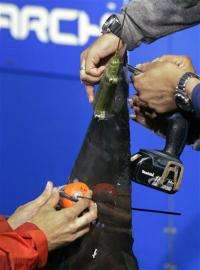
(AP)—The scientists and fishermen on board the Ocearch, a repurposed crabbing vessel, received word that their scouting boat had hooked a great white shark, sparking a flurry of activity.
They were about to get up close and personal with the animal, more than 2,000 pounds (900 kilograms) and nearly 15 feet (5 meters) long.
"I'm nervous," said state shark expert Greg Skomal, who has tagged great whites, but never like this, never this close.
The Ocearch crew tags great white sharks in an unorthodox way. Unlike Skomal's team, which has tagged a dozen great whites off the Massachusetts coast with harpoons, Chris Fischer's Ocearch crew baits the fish and leads them onto a large platform that lifts them out of the water for tagging and collecting blood, tissue and semen samples.
Ocearch, a nonprofit research organization named for a combination of "ocean" and "research," is crewed mainly by sport fishermen. It is funded by sponsors and donors, and a South Africa expedition was the subject of History channel's "Shark Wranglers."
Now, Ocearch has come to Cape Cod for a few weeks, minus the reality show and plus local scientists, to help shed light on the sharks' migration patterns, protect breeding and birthing sites, improve public safety and raise awareness about the threatened species that is a rising presence in the area.
"We have massive knowledge gaps about how to protect their future," said Fischer, Ocearch's expedition leader.
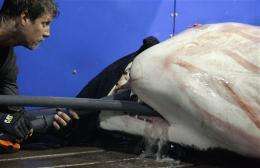
Ocearch's real-time satellite tags last five years. Each time sharks' dorsal fins breaks the surface, the tags ping a satellite and mark an online map, accessible to researchers and the public.
The work is dangerous for both man and fish. One shark died on the lift in South Africa. The crew tries to return sharks to the water within 15 minutes.
"I used to be nervous of what they'd do to me," co-captain Jody Whitworth said. "Now I worry that we'll hurt them."
The Cape Cod expedition faces another challenge: finding the fish.
While great white sightings have risen near Cape Cod, they are much more common off South Africa or Australia.
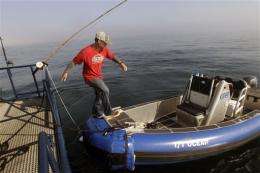
Skomal estimates 30 great whites roam the Cape Cod coast on any given day. The Ocearch crew hopes to tag five.
Protecting these sharks is key, researchers say.
"These predators keep the next lower level in check," said Bob Hueter, of Mote Marine Laboratory, one of the research organizations working with the Cape Cod expedition. "It's a system of checks and balances."
The great white is the "lion of the ocean," keeping seal, squid and fish populations in check, Fischer said. But it is also the shark that people are most interested in, making it a gateway for ocean conservation and advocacy, he said.
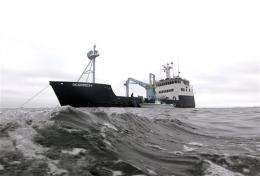
Catching a shark starts with chum, drawing sharks to the boat by placing whale blubber and other shark favorites in the water a mile out from the ship.
Fischer says the crew doesn't draw sharks, as critics have claimed, but merely leads nearby sharks to the boat.
Most of Fischer's crew spends each day on a boat barely bigger than the great whites, traveling among chum locations and looking for sharks.
Just after dusk on Sept. 13, they spotted a great white and hooked it. Then, the small boat's crew slowly led the shark four miles to the 126-foot Ocearch.
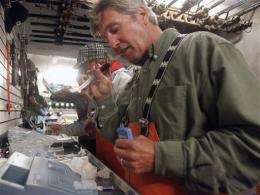
Ocearch Capt. Brett McBride guided the shark onto the wooden platform with metal sides. Barefoot, he jumped in too. The lift slowly rose out of the water, level with Ocearch's deck.
The shark thrashed and bared her teeth as the water receded, curving her head and tail into the air.
McBride threw a wet towel over her eyes and removed the two-foot hook from her mouth. He pumped water over her gills with two large hoses.
The crew jumped onto the lift in their jeans and long-sleeve shirts, and the clock began.
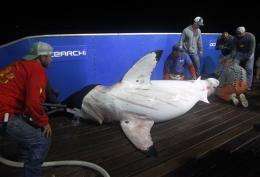
They measured the fish—14 feet, 8 inches (4.5 meters) and 2,292 pounds (1,039 kilograms)— and screwed the satellite tag, an accelerometer and an acoustic tag onto her dorsal fin with a power drill. Researchers collected blood and tissue samples.
McBride named the female shark Genie after renowned shark researcher Eugenie Clark.
After nearly 15 minutes, everybody scrambled off as the lift was lowered back into the water.

McBride grabbed Genie's tail and slowly guided her back into the ocean. They were done in 16 minutes flat. Genie drifted down into the dark water. The crew clinked beer cans and soda cups.
"That one shark alone was worth the trip," McBride said, noting she might lead researchers to breeding and birthing sites. "Any time we tag a great white shark it adds tremendous information to what we already know, which is very little."
Genie has pinged several times in the waters off Nantucket. So far, she's the crew's only catch.
Copyright 2012 The Associated Press. All rights reserved. This material may not be published, broadcast, rewritten or redistributed.



















